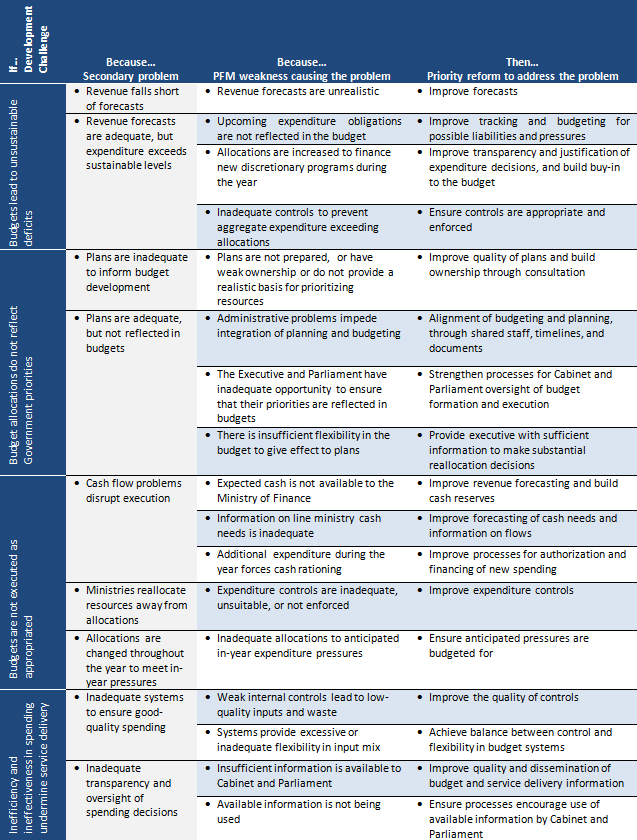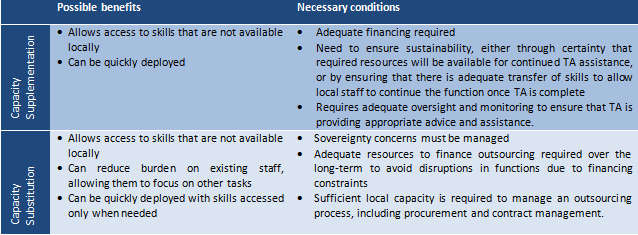Public Financial Management (PFM) systems in Pacific contexts are often very different from the sophisticated and comprehensive systems operating in larger, wealthier countries. Those working on PFM in Pacific contexts must grapple with difficult questions: What needs to be done, when achieving across-the-board “good practice” standards is not feasible? What should be done immediately, and what can wait? How can reforms be implemented and sustained in the context of very small public services and shortages of staff with vital specialized skills (as described in our previous blog post here)?
My new Guidance Note [pdf], produced jointly by the World Bank and IMF/PFTAC, is intended to help government officials and donor agencies answer such questions. Drawing on regional experience, the note emphasizes the importance of: i) prioritizing PFM reform efforts towards specific development problems; and ii) considering a broader range of mechanisms to address capacity constraints.
Prioritize PFM reforms towards specific development problems
With limited capacity and resources available to support improved PFM systems in Pacific Island Countries (PICs), plans to implement the full range of “good practices” seen in developed countries (and measured in PEFA assessments) are seldom feasible.
Prioritization of reforms is therefore vital and should be guided by identification of the PFM reforms that are likely to have the greatest impact in achieving development objectives and policy goals. Development priorities will vary according to country context, and PFM priorities should therefore also vary across countries.
By linking PFM-related development challenges firstly to PFM weaknesses and then to specific reforms to address weaknesses, PFM priorities can be identified that reflect national development priorities. PFM practitioners can begin with the broad problem they wish to address and then target resources towards a small number of specific reforms that might address that problem. A framework to guide this process is presented below and elaborated in the table below:
Consider a broader range of mechanisms to address capacity constraints
Shortage of staff with required technical skills is one of the primary constraints to PFM reform in PICs. Capacity building is commonly cited as a means to address capacity constraints. But capacity building will not be an adequate solution if there is an absence of specialized technical skills that cannot be acquired through short-term, on-the-job training. Capacity building efforts may also be undermined if there are simply not enough staff available to undertake required tasks or if there is high staff turnover. As a result, advisors formally engaged in capacity building roles often find themselves undertaking capacity supplementation and capacity substitution. Such non-transparent arrangements lead to inadequate accountability and inappropriate reporting arrangements.
In certain contexts, capacity supplementation and capacity substitution can be legitimate alternative mechanisms for filling capacity gaps. “Capacity supplementation” involves the provision of continuing support to staff undertaking certain functions, delivered through advisors, regional institutions, internship schemes, and regional professional bodies. “Capacity substitution” involves “outsourcing” of specific PFM functions on a long-term basis, with external specialist individuals or agencies performing line functions on a long-term or permanent basis.
Claims that such solutions are less sustainable than capacity building need to be carefully tested given the opportunity costs of staff time used in acquiring and applying new PFM skills, and the mixed success of capacity building efforts in the region. The possible benefits and necessary conditions for capacity supplementation and capacity substitution are outlined in the following table:
Tobias Haque is an Economist with the World Bank.





Leave a Comment